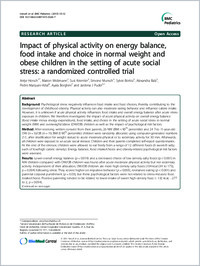Impact of physical activity on energy balance, food intake and choice in normal weight and obese children in the setting of acute social stress : a randomized controlled trial
- Horsch, Antje Centre Hospitalier Universitaire Vaudois, Lausanne
- Wobmann, Marion Université de Lausanne
- Kriemler, Susi Universität Zürich
- Munsch, Simone Universität Fribourg, Schweiz
- Borloz, Sylvie Centre Hospitalier Universitaire Vaudois, Lausanne
- Balz, Alexandra Centre Hospitalier Universitaire Vaudois, Lausanne
- Marques-Vidal, Pedro Université de Lausanne, Lausanne
- Borghini, Ayala Centre Hospitalier Universitaire Vaudois, Lausanne
- Puder, Jardena J. Centre Hospitalier Universitaire Vaudois, Lausanne
-
19.02.2015
Published in:
- BMC Pediatrics. - 2015, vol. 15, no. 12, p. 1-10
Childhood obesity
Physical activity
Energy balance
Food intake
Food choice
Stress
Parenting
Comfort food
English
Background: Psychological stress negatively influences food intake and food choices, thereby contributing to the development of childhood obesity. Physical activity can also moderate eating behavior and influence calorie intake. However, it is unknown if acute physical activity influences food intake and overall energy balance after acute stress exposure in children. We therefore investigated the impact of acute physical activity on overall energy balance (food intake minus energy expenditure), food intake, and choice in the setting of acute social stress in normal weight (NW) and overweight/obese (OW/OB) children as well as the impact of psychological risk factors. Method : After receiving written consent from their parents, 26 NW (BMI < 90th percentile) and 24 7-to 11-year-old OW (n = 5)/OB (n = 19, BMI ≥ 90th percentile) children were randomly allocated using computer-generated numbers (1:1, after stratification for weight status) to acute moderate physical or to sedentary activity for 30 min. Afterwards, all children were exposed to an acute social stressor. Children and their parents completed self-report questionnaires. At the end of the stressor, children were allowed to eat freely from a range of 12 different foods (6 sweet/6 salty; each of low/high caloric density). Energy balance, food intake/choice and obesity-related psychological risk factors were assessed. Results: Lower overall energy balance (p = 0.019) and a decreased choice of low density salty foods (p < 0.001) in NW children compared with OW/OB children was found after acute moderate physical activity but not sedentary activity. Independent of their allocation, OW/OB children ate more high density salty foods (104 kcal (34 to 173), p = 0.004) following stress. They scored higher on impulsive behavior (p = 0.005), restrained eating (p < 0.001) and parental corporal punishment (p = 0.03), but these psychological factors were not related to stress-induced food intake/choice. Positive parenting tended to be related to lower intake of sweet high density food (−132 kcal, −277 to 2, p = 0.054). Conclusions: In the setting of stress, acute moderate physical activity can address energy balance in children, a benefit which is especially pronounced in the OW/OB. Positive parenting may act as a protective factor preventing stress-induced eating of comfort food.
- Faculty
- Faculté des lettres et des sciences humaines
- Department
- Département de Psychologie
- Language
-
- English
- Classification
- Medicine
- License
-
License undefined
- Identifiers
-
- RERO DOC 323670
- DOI 10.1186/s12887-015-0326-7
- Persistent URL
- https://folia.unifr.ch/unifr/documents/307572
Statistics
Document views: 175
File downloads:
- Texte intégral: 154
